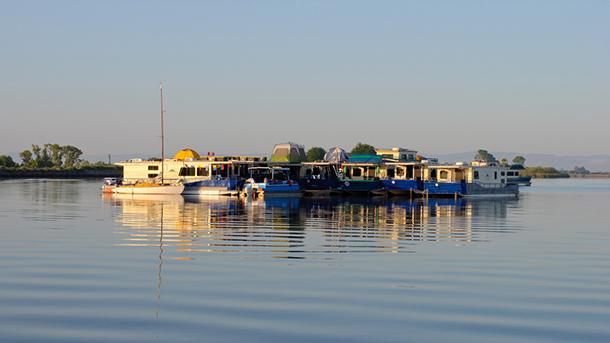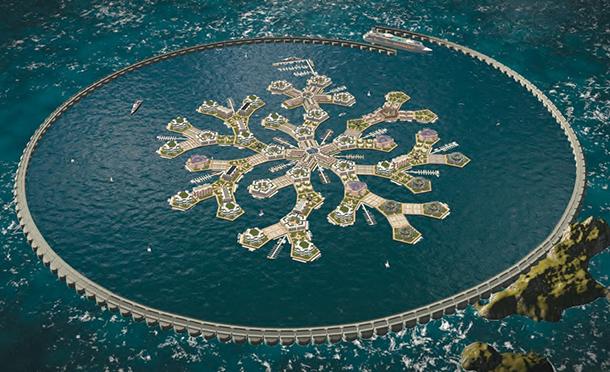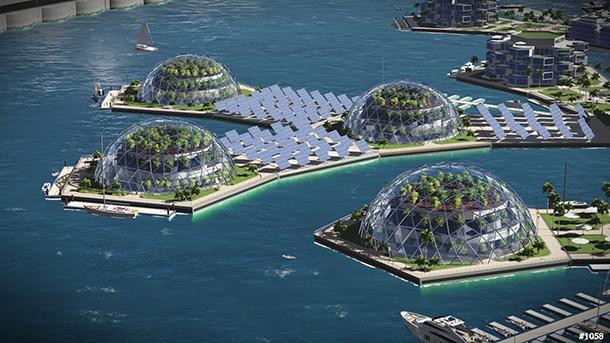The ‘seasteading’ movement imagines floating cities in the sea
This is an artist’s concept of a seastead called “Artisanopolis," which would feature aquaponics greenhouse domes for growing food.
The Seasteading Institute in California has an audacious mission: to establish floating societies that will “restore the environment, enrich the poor, cure the sick, and liberate humanity from politicians.”
Like in the 19th century, when many people left the cities of the Eastern US to gain independence by claiming a patch of land and working it — which was known as "homesteading" — "seasteaders" hope to create a new social, economic and political frontier on the ocean.
That’s the vision of “seavangelist” Joe Quirk, author of the new book, "Seasteading: How Floating Nations Will Restore the Environment, Enrich the Poor, Cure the Sick and Liberate Humanity from Politicians."
Quirk got involved in the seasteading movement after attending his 10th Burning Man festival. He says he became fascinated by watching rules emerge that “are not predictable from their initial parameters.” “You start imagining, what if we could have more societies like these? What if they didn't just last a week, but all year round?” Quirk says. “What if we could have hundreds [of these societies]? What interesting ways that people could get along would we discover?”
Someone introduced him to Patri Friedman, founder of the Seasteading Institute, who told him about the principles of seasteading, of building floating cities on the sea. As soon as Quirk got home, he found Friedman’s blog on the internet. That, he says, was his conversion moment.
“Patri identified the problem that governance doesn't get better as quickly as other forms of technology because it doesn't vary or select except through revolution and war,” Quirk says. “If society floated, and if these floating societies were ‘disassemblable’ and ‘reassemblable’ according to the choices of the residents, that would be variation by governments and selection by citizens.”
So, Quirk contacted the Seasteading Institute and offered to co-write a populist book with Patri, “not just about the ideas,” he says, “but about the actual people trying to make it happen, who I call ‘aquapreneurs.’”
About a year after the Seasteading Institute was founded, the group began an experiment called Ephemerisle, a name that combines “ephemera” with “isle.” It's an annual festival in Northern California’s Sacramento Delta that has been described as Burning Man on the water.

“If you want to attend, you have to bring your own land,” Quirk says. “So people rent boats, they get giant platforms — anything that can be put together to float. The idea was that, as people learn the lessons of living together on the water and solve technical challenges, it would slowly expand and move out to the sea.”
Despite some ups and downs, Ephemerisle demonstrated the social principles of seasteading exactly as originally described by Patri Freedman, Quirk says.
“He elucidated that if you lived on the ‘fluid frontier’ and land was modular and disassemblable, people who didn't get along could ‘vote with their house’ and go form their own separate jurisdiction,” he explains. “As long as people can choose among them voluntarily, we think we'd create many different solutions for how to live together, which would set examples that could change the world.”

Creating cities on the water poses huge engineering challenges. Building in shallow waters is technically possible right now, but building in high waves is so difficult and expensive that only fossil fuel companies can afford it, Quirk says. So, the Seasteading Institute is starting small, with a project in French Polynesia.
“We're negotiating with them to create a special, legal island known as a ‘seazone’ in their territorial waters, so we can apply existing Dutch technology for sustainable floating islands in shallow waters to demonstrate the business model — two or three pilot platforms in a very small and nonthreatening way, such that we would absorb the risk,” Quirk explains.
French Polynesia is an ideal place to start because it’s close enough to the equator that it doesn't experience high waves, and it’s in very warm waters, Quirk says. “It's not threatened by cyclones and it is blessed with lots of natural wave breakers, from atolls to lagoons, and it also has lots of very deep water. This is the ‘blue frontier,’ where we can expand seasteading incrementally.”
Seasteading questions a whole host of assumptions about how people live together and govern themselves, Quirk says. From sustainable construction to agriculture to health care, seasteading requires its planners and participants to rethink just about everything about living on land. Seasteading is also an immediate solution to the looming problem of sea-level rise, which is already threatening coastal countries, especially in the Pacific islands, Quirk says.
“French Polynesia sees itself as the ‘blue frontier’ and they are initiating the ‘blue economy,’” Quirk says. “They want to get this started in French Polynesia to demonstrate that this can work … If people like these floating nations, and they are no threat to the world, and they're providing better solutions and they are as delightful as cruise ships, I think we have a humanitarian case to petition the nations of the world to recognize these floating nations as sovereign.”
This article is based on an interview that aired on PRI’s Living on Earth with Steve Curwood.
